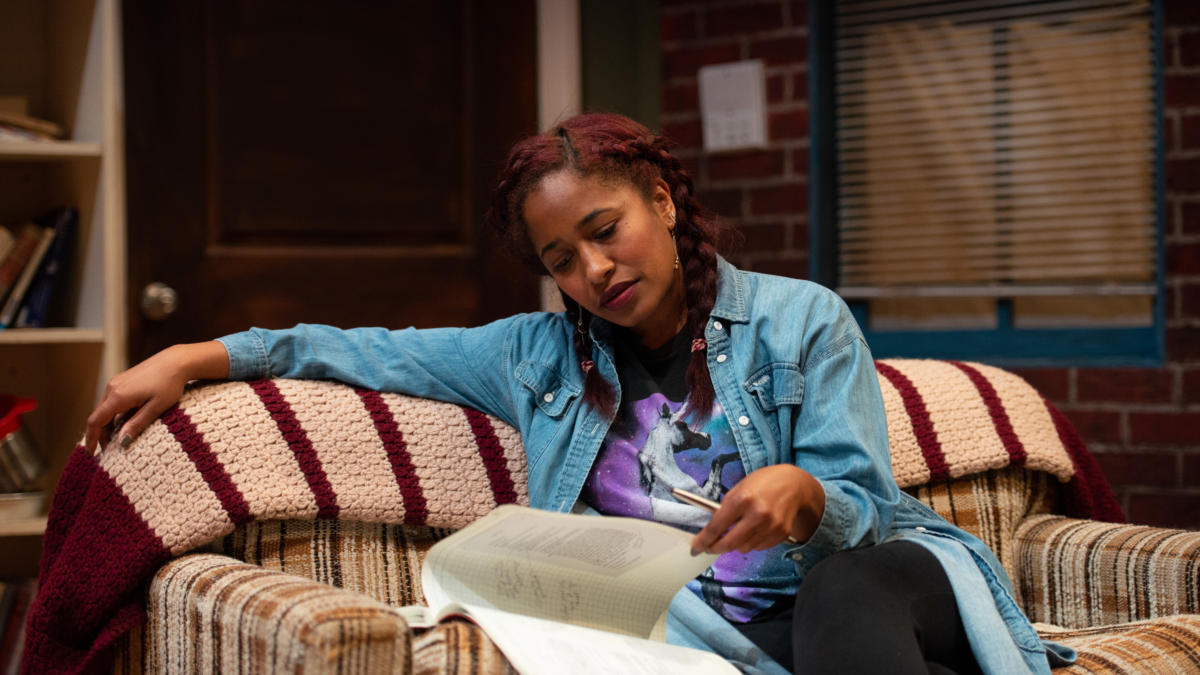It would have been enough to be the first black woman director to win a Barrymore Award.
Amina Robinson recently laid claim to that honor for her thorough guidance over “The Color Purple,” a Theatre Horizon musical production that netted prizes in six of the nine categories for which it was nominated.
With “inclusion” the new buzzword in Philly theater, people of color and women are helming shows rarely seen before with stories that are integral to black, female and LGBTQ communities.
Which leads us, directly, to the socio-political drama that Robinson and her longtime Temple University student-turned-“Color Purple” actor Victoria Aaliyah Goins tackled at Azuka Theater with “Sunset Baby,” a play whose rehearsal started right after October’s Barrymores.
“The very next morning,” said Robinson, laughing at the thought of but eight hours of celebrating “Color Purple” victories before jumping into the tender and tautly streetwise soliloquy of “Sunset Baby.” On Jan. 24, several cast members from “The Color Purple” – guided by that show’s victorious director, will reunite to take on the comedic R&B musical about evil alien plant life, “Little Shop of Horrors: In Concert,” at Norristown’s Theatre Horizon.
With Goins as its titular star, director Robinson and playwright Dominique Morriseau told a smart story of a Black Panthers-esque revolutionary-turned-political prisoner trying to reconnect with his estranged “Sunset Baby,” Nina, after years of ignoring her and her now-dead activist mother. A series of letters written from mother to a then-jailed father – correspondences valuable to historians – are all that was willed to Nina. The letters also happen to be the only thing left to connect father to daughter, and their revelation shows how emotion and devotion to cause steered the personal and political, while presenting the consequences of placing one over the other.

“There are casualties in every war, and Nina explores the ramifications of fighting and sacrificing one’s life for the greater good and the effects that that leaves on the individuals,” said Robinson, keen to allow the playwright’s author notes, and its exploration of the music and life of Tupac Shakur guide the way. “Tupac could be edifying for our community as he was socially conscious and aware, while rapping about (having his way with) women and partying. Both of those things existed in him at the exact same time. There’s a duality there, the same of which exists in “Sunset Baby,” where one truth can live while its opposite exists at the exact same time.”
Both Robinson and Goins point to the character of Nina’s paramour, Damon (portrayed by Eric Carter), who while tough and street savvy, is also intelligent, well read and nurturing. “You wouldn’t expect these things to exist in one character, at the same time, but we allow for fully nuanced beings on-stage for this,” said Robinson.
Such nuance and duality are the stage elements that push “Sunset Baby” from activist polemic and its 80s-centric, crack epidemic identifiers into the radically personal. Robinson can relate.
“Not because my mother was a crack addict,” she laughed. “That was not my circumstance. I am, however, a product of so many of the issues the play brings up. I am probably Nina’s age now. My parents grew up during the time of the activism that the character Kenyatta Shakur went to jail for in the play. The crack epidemic ran through our neighborhoods in South Philly. I was around for all of that. I knew people with those circumstances. This play is my generation.”
Robinson’s circumstances, by the time she was 16, were that of a typically restless teen. Her mom even called the young Amina a quitter, something that seemed to bug the teen to her core. “I wanted to be a writer, then I stopped. Wanted to be a dancer, then I stopped. She was right, but I was like ‘Wow. That hurt.’”
Once in college at Temple University, Robinson nearly went the radio-television-film major route until she realized that it was a behind-the-scenes workload. “Math, which I hate.” Instead, she walked across the hall to the theater department and found her calling.
“I did a play for a fellow student who is my best friend still to this day and I got bit, because the nature of theater is that you are always stopping, always quitting, but in small, short doses. I realized [while there] that I was not a quitter, but rather an artist. I crave the next thing, and then the next.”
Such episodic finality first led her to be a travelling actor after Temple’s grad school with touring theater productions of “Mamma Mia,” and “Little Shop of Horrors,” then a time in Manhattan and Los Angeles doing the television and film thing with credits including Lee Daniels’ “Precious,” Showtime’s “Nurse Jackie” and NBC’s “Law & Order: Special Victims Unit.” All this running around, though, put a hold on other aspects of her life, the deeply personal, so Robinson returned to Philly and became a mother.
How she could behold motherhood and remain in the theater is what led her to a professorship at Temple (where she teaches several classes at present), and then, through the university, a career in directing.
“The crack epidemic ran through our neighborhoods in South Philly. I was around for all of that. I knew people with those circumstances. This play is my generation.”
— Theatrical director and Barrymore Award winner, Amina Robinson
“I had just started at Temple, teaching wonderful young artists, when one of my students, Jordan Dobson, was in “Cabaret” at the Arden, directed by Matt Decker,” she recalled.
At the same time, Decker, a co-founder and resident director at Theatre Horizon, revealed that his company had just won the rights to playwright Marsha Norman and composer Brenda Russell’s musical, “The Color Purple” and was looking for a local black woman director to helm it. Dobson told Decker that he should talk to Robinson, and the rest was history. Robinson had only ever directed student showcases, a version of “Godspell” at Temple, and “74 Seconds … to Judgment” with Kash Goins for Arden Theater before coming to “The Color Purple,” and was hardly prepared for the massive undertaking of cast, staging, choreography and such.
“In nine days we had to be ready to run the show,” said Victoria Aaliyah Goins of her director in “Purple” and “Sunset Baby.” “Amina is efficient; wildly efficient. She told the cast that rehearsal might look chaotic and seem a little less exploratory and artistic, but she broke rehearsals up into a production line where she, the choreographer and such were working with different actors at one time.”
Within nine days of such diverse, desperate activity the entire cast of “The Color Purple” was ready, and, remarkably, 90 percent off book. “They were an amazingly dynamic bunch of individuals,” said Robinson, gleefully. “All I had to do was make it pretty.”
As for her historic Barrymore victory and her continuing career in directing “Sunset Baby,” Robinson is proud, but said she is so invested in her acting ensembles’ work, that she doesn’t pay attention to medals and prizes. “I was overwhelmed in the best way because you’re working with a group of people who become family in shows that transcend their space and time. When we won, all I can remember thinking is like ‘Oh, wait. Other people thought it was as magical as I did?”
With “Sunset Baby,” that space and time is a specific slice of life in America, Black America. “This show is exciting and truthful,” said Robinson. “Sunset Baby” very well could expose people to a life of Black Americans they were unaware of, that they never witnessed before. There are people here, that you see every day on the street. You’ll see them in a different light here. You’ll understand the full humanness of people for whom we try to deny humanity.”
As for “Little Shop of Horrors” in January, Robinson will be pleased to see her “Color Purple” cast, and to do this concert version of the kitschy Howard Ashman/Alan Menken musical (based on the film by Roger Corman and Charles Griffith) just for kicks. “This one is just pure fun, something this crew and I know how to do really well.”





